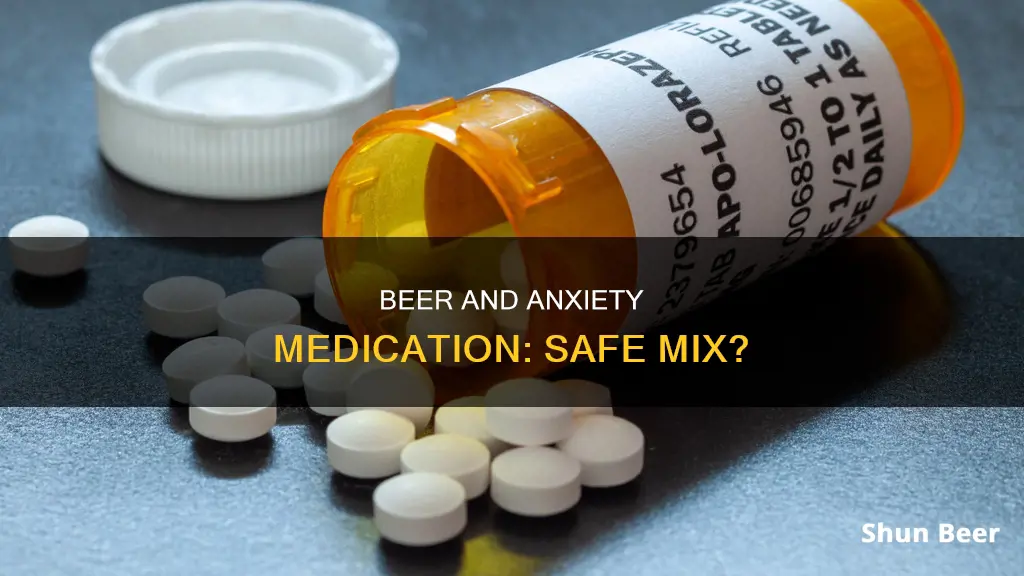
Drinking alcohol while taking anxiety medication is a potentially dangerous combination. Alcohol can interact with many medications, including those for anxiety, and can lead to adverse reactions, negative side effects, and even overdose or death. The specific type of anxiety medication is a key factor in determining the risks of combining it with alcohol. For example, mixing benzodiazepines, a class of drugs including Xanax, with alcohol can lead to serious, potentially deadly side effects, including respiratory depression and lethal overdoses. On the other hand, selective serotonin reuptake inhibitors (SSRIs), a commonly prescribed class of antidepressants that can also be used for anxiety, are less likely to interact with alcohol, and an occasional drink is unlikely to cause harm. However, even with SSRIs, drinking alcohol can lead to more and different side effects and risks.
Can you drink beer while taking anxiety medication?
| Characteristics | Values |
|---|---|
| Is it safe to drink beer while taking anxiety medication? | No, it is not safe to mix alcohol with anxiety medication. |
| Why? | Alcohol and anxiety medication are both sedatives, and their combined use can lead to serious, potentially deadly side effects, including lethal overdoses and respiratory depression. |
| Are there any exceptions? | According to Dr. Jody Glance, an addiction medicine specialist, selective serotonin reuptake inhibitors (SSRIs) are less likely to interact with alcohol than other types of anxiety medication. However, even with SSRIs, an occasional drink is recommended rather than regular drinking. |
| What are the risks of drinking alcohol while taking anxiety medication? | The combination of alcohol and anxiety medication can intensify the effects of both, leading to sedation, slowed breathing, unconsciousness, or even death. It can also increase the risk of overdose, depression, drowsiness, dizziness, impaired motor control, strange behaviors, and heart or liver damage. |
| What should you do if you want to drink alcohol while taking anxiety medication? | Consult your healthcare provider for specific medical advice. Do not skip or stop taking your medication without consulting your doctor first. |
What You'll Learn

The dangers of mixing Xanax and alcohol
Xanax and alcohol are two substances that should never be mixed. Both are depressants, slowing down motor skills, speech, reflexes, breathing, heart rate, and more. When combined, they exaggerate each other's effects, and even in small doses, this can be dangerous.
Increased sedative effect
When alcohol and Xanax are taken together, both substances become more potent than when taken alone. This can lead to exaggerated sedation, making you accident-prone, and you can easily become unconscious and stop breathing.
Impaired memory and cognitive function
Mixing Xanax and alcohol can impact your memory. You may find yourself unsure if you already took a pill or unclear about how many drinks you've had. Mixing the two can also affect the brain's ability to process information, making it difficult to concentrate or make decisions.
Respiratory depression
When combined, Xanax and alcohol can lead to respiratory depression, or hypoventilation, where your breathing slows to dangerous levels. This can be fatal and may lead to a coma or death.
Increased risk of overdose
As both substances are depressants, taking them together can cause the body to slow down to dangerous levels, leading to respiratory failure, cardiac arrest, or other life-threatening complications. There have been countless cases of overdose by combining the two.
Long-term effects and addiction
Mixing Xanax and alcohol can cause severe issues with your liver, ranging from a fatty liver to cirrhosis of the liver, which can be fatal and may require a liver transplant. Additionally, there is a risk of becoming addicted to both substances, and both are among the worst to detoxify from.
Risk of polysubstance abuse disorder
Abusing multiple drugs is called polysubstance abuse, and professional treatment is needed to recover. If you or someone you know is struggling with this dangerous combination, it is important to seek help as soon as possible before the effects become irreversible.
Beer and Clonazepam: Safe Mix or Risky Business?
You may want to see also

Lexapro and alcohol side effects
Lexapro (Escitalopram) is a common antidepressant used to treat anxiety and depression. It belongs to the Selective Serotonin Reuptake Inhibitors (SSRI) class of drugs, which work by restoring serotonin deficiencies in the brain. Serotonin is a neurotransmitter that is partially responsible for regulating emotions.
While Lexapro is considered one of the safest antidepressants, there are risks associated with its use, particularly when combined with other substances like alcohol. Here is some more information about the side effects of mixing Lexapro and alcohol:
The combination of Lexapro and alcohol is generally advised against due to the potential for dangerous side effects. Even small amounts of alcohol can lead to a range of unpleasant and harmful effects. Here are some of the possible side effects of mixing Lexapro and alcohol:
- Worsening depression: Alcohol is a depressant and can counteract the effects of Lexapro, leading to increased depressive symptoms.
- Decreased effectiveness of medication: Alcohol can interfere with how Lexapro is absorbed in the body, reducing its effectiveness in treating anxiety and depression.
- Spikes in blood pressure: This can be a dangerous consequence of mixing Lexapro and alcohol, leading to increased risk of cardiovascular events.
- Suicidal thoughts and ideation: The combination of alcohol and Lexapro can increase the risk of suicidal thoughts and behaviours.
- Increased anxiety: Instead of relieving anxiety, alcohol can actually worsen anxiety symptoms, especially when combined with Lexapro.
- Violent behaviour: In extreme cases, the combination of alcohol and Lexapro can lead to violent behaviour.
- Impaired judgement and alertness: Mixing alcohol with Lexapro can make it harder to perform tasks that require sharpness and alertness.
- Liver damage: Long-term alcohol use while on Lexapro can lead to liver damage due to increased alcohol usage.
- Addiction: The combination of alcohol and Lexapro can lead to a higher risk of alcohol abuse and addiction.
It is important to note that these side effects may vary from person to person, and not everyone will experience all of them. However, the potential risks of mixing Lexapro and alcohol are significant, and it is generally recommended to avoid this combination. If you are taking Lexapro and are considering drinking alcohol, it is crucial to consult your doctor or healthcare provider for personalized advice and guidance.
Vaccination and Beer: What's Safe to Drink?
You may want to see also

SSRIs and alcohol
Drinking alcohol while taking SSRIs (selective serotonin reuptake inhibitors) is not recommended. While SSRIs are considered safe and effective in treating depression and other disorders, they do not mix well with alcohol.
SSRIs are commonly used to treat depression, post-traumatic stress disorder, and obsessive-compulsive disorder. They work by changing the way the brain processes serotonin, the mood hormone. This helps to stabilise moods and lessen the symptoms of mental illness. However, when combined with alcohol, the sedative effects of SSRIs can become more intense, and side effects can be more severe.
For example, Prozac, the brand name for fluoxetine, is an SSRI that acts as a sedative, calming you down and making you feel tired. When mixed with alcohol, this sedative effect is amplified, impairing your judgment and motor skills. This can lead to dangerous situations, especially when operating machinery or driving a car.
In addition, alcohol is a depressant, and mixing it with SSRIs can worsen depression symptoms over time. Alcohol affects the way the brain processes serotonin and also releases dopamine, the pleasure chemical. This provides short-term relief, but over time, drinking makes depressive episodes more intense and longer-lasting. This can create a cycle where the urge to self-medicate with alcohol increases as depressive feelings worsen. People with depression are also more likely to become addicted to alcohol.
While some doctors think it's okay to drink moderately while taking an SSRI, it's important to consult your doctor first. It's recommended to take the SSRI long enough to know how it affects you before introducing alcohol. If you're at low risk of alcohol misuse and want to drink occasionally, your doctor may advise that this is safe to do so in moderation.
Beer and Chardonnay: A Match Made in Heaven?
You may want to see also

Addiction risks
Mixing alcohol with anxiety medication can lead to a heightened risk of addiction and substance use disorders. This is because both alcohol and benzodiazepines (a common type of anti-anxiety medication) are central nervous system depressants, which means they slow down brain activity. When combined, they can increase the intensity of their effects, including sedation and slowed breathing. This can lead to a greater risk of overdose and even death.
Benzodiazepines, such as Xanax (alprazolam), are highly addictive, and the risk of addiction is increased when combined with alcohol. Alcohol itself can also be addictive and lead to alcohol use disorder. People who binge drink are more likely to use other substances, such as benzodiazepines, which can further increase the risk of addiction and substance use disorders.
Additionally, the use of alcohol and benzodiazepines can lead to physical dependence, where the body relies on the presence of these substances to function normally. This can make it difficult to stop using them, as stopping suddenly can lead to withdrawal symptoms such as anxiety, restlessness, seizures, and delirium.
Furthermore, the combination of alcohol and anxiety medication can impair judgement and increase the risk of misuse. This is especially true for individuals who already struggle with alcohol abuse or misuse. The impaired judgement can lead to an increased risk of overdose or other harmful consequences.
It is important to note that the risk of addiction and substance use disorders is not limited to the combination of alcohol and benzodiazepines. Other types of anxiety medications, such as selective serotonin reuptake inhibitors (SSRIs) and buspirone, can also interact with alcohol and increase the risk of addiction and other negative consequences.
To reduce the risk of addiction and substance use disorders, it is generally recommended to avoid consuming alcohol while taking any type of anxiety medication. It is always best to consult with a healthcare professional to understand the specific risks and recommendations for the medication you are taking.
Beer and Kidney Function: A Healthy Relationship?
You may want to see also

Alcohol's effect on depression
Alcohol is a depressant, and drinking it can lead to or worsen symptoms of depression. It can alter the delicate balance of chemicals in the brain, affecting mood and leading to worse mental health. Drinking heavily and regularly is associated with depression. Alcohol slows down processes in the brain and central nervous system, initially making one feel more relaxed and less inhibited. However, these effects wear off quickly, and as one continues to drink, they become drowsy and have less control over their actions.
Drinking heavily can harm your brain and lead to depression. Research has shown a bidirectional relationship between alcohol use disorder (AUD) and depressive disorders. Both disorders can exist together, with each disorder increasing the risk for the other. Additionally, each disorder can worsen the other. For instance, people who are depressed and drink excessively have more frequent and severe episodes of depression and are more likely to contemplate suicide. Heavy alcohol use can also reduce the effectiveness of antidepressants.
Drinking alcohol can also lead to more and different side effects and risks when combined with antidepressants. For example, the mix of alcohol and Lexapro can lead to more side effects than taking Lexapro alone. Together, they can make one feel sleepy, dizzy, confused, and weak. In extreme cases, it can even lead to violent behaviour.
While a drink every once in a while can be okay, drinking excessively can lead to alcohol use disorder. This is characterised by a pattern of binge drinking, an increased alcohol tolerance, and drinking more than intended. Social and cultural factors, past trauma, and genetics are all risk factors for this disorder.
Beer and Periods: Is It Safe to Drink?
You may want to see also
Frequently asked questions
It is not recommended to drink beer or any other form of alcohol while taking anxiety medication. Mixing alcohol with anxiety medication can lead to serious side effects and even death.
Combining alcohol with anxiety medication can cause a range of side effects, including:
- Drowsiness
- Dizziness
- Impaired motor control and coordination
- Difficulty breathing
- Strange behaviors
- Heart or liver damage
- Respiratory depression
- Unconsciousness
Selective serotonin reuptake inhibitors (SSRIs) are less likely to interact with alcohol than other types of anxiety medications. However, it is still important to speak to your healthcare provider before consuming any alcohol while taking any medication.
It is generally not recommended to drink alcohol while taking antidepressants. Alcohol can interact with antidepressants and cause more side effects and increase the risk of overdose. Additionally, alcohol can make depression worse and change the balance of chemicals in your brain that affect your mood.
If you want to drink alcohol while taking anxiety medication, it is important to speak to your healthcare provider first. They can advise you on the risks and provide guidance on how to safely consume alcohol while taking your medication.







